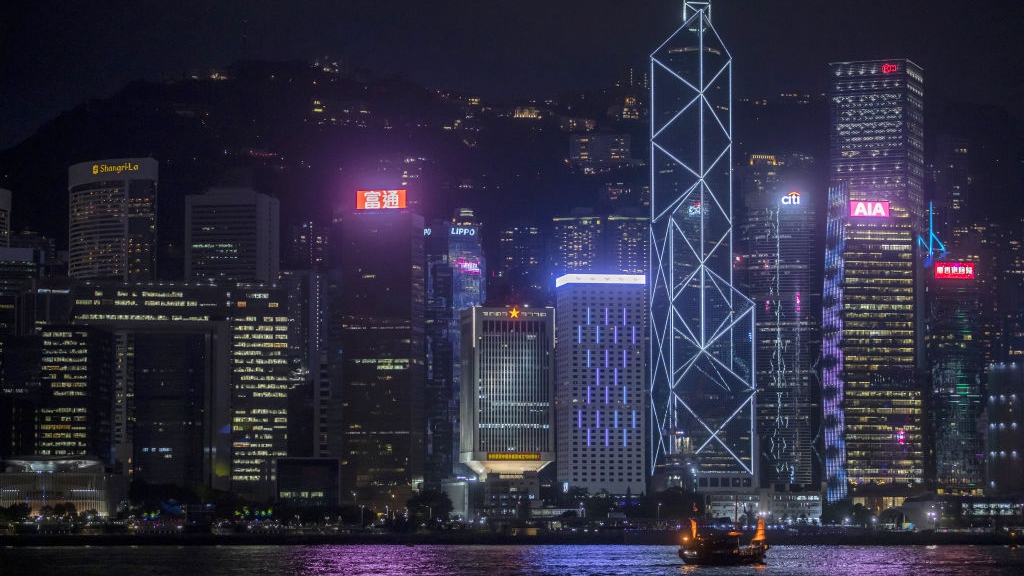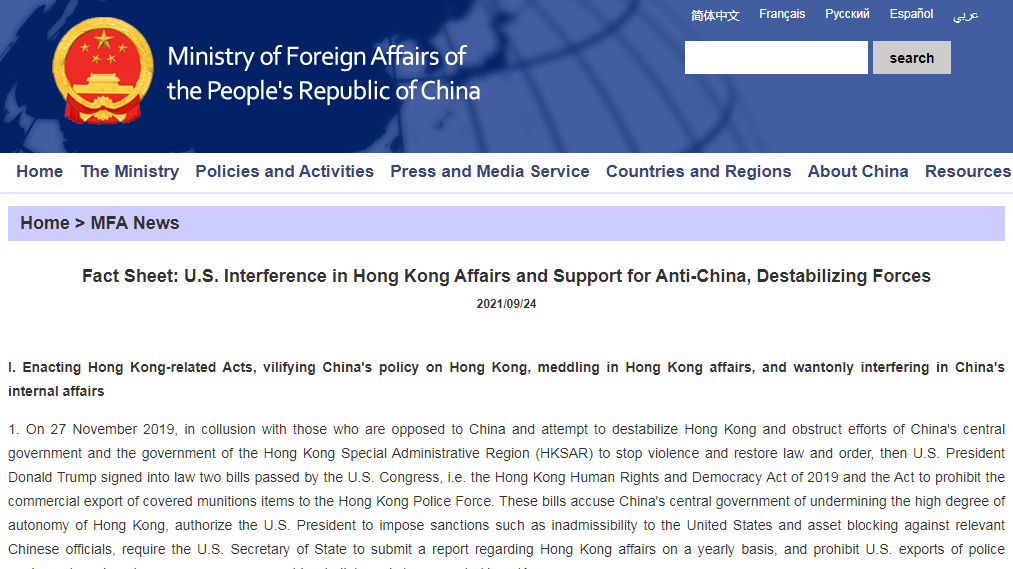
A night view of Victoria Harbor in Hong Kong, China, July, 1, 2021. /Getty
A night view of Victoria Harbor in Hong Kong, China, July, 1, 2021. /Getty
Editor's note: Stephen Ndegwa is a Nairobi-based communication expert, lecturer-scholar at the United States International University-Africa, author and international affairs columnist. The article reflects the author's opinions and not necessarily the views of CGTN.
As the United States becomes increasingly desperate to hold on to a hegemonic past that is fast fading away, it is also becoming more blatant in its quest to maintain the status quo. The U.S.'s version of intervention has done more harm than good to the world, having been based on achieving objectives that have nothing or little to do with its hosts or partners.
However, the rise of China is a phenomenon that gives the U.S. extreme anxiety. The superpower is hell bent on using all means possible to clip the wings of its formidable geopolitical rival. The strategy involves attacking the country's legitimate interests in order to weaken the object of its envy from the roots.
As is currently happening in China's Taiwan region, the Hong Kong Special Administrative Region (HKSAR) is one of the sites that the U.S. has identified for a fight in its quest for dominance both in the Asia-Pacific and Indo-Pacific regions. In its usual posturing as a human rights defender and democracy advocate, the country has instigated unrest in the HKSAR in the last few years. On September 24, the U.S., Japan, India and Australia held their first summit in an attempt to undermine China's influence in the Indo-Pacific region.
It had disrupted quite a bit of HKSAR's governance, but the HKSAR has grown more resilient under the leadership of the Chinese government. The success of the recent voting of the 2021 Election Committee's subsector ordinary elections is testament of the maturity "One Country, Two Systems" principle. Contrary to ugly scenes witnessed in the U.S.-style electoral politics elsewhere, the HKSAR elections were devoid of bickering and other instances of contestation, which authorities said marks transition from chaos to governance.
It was a good time to finally lift the lid of the U.S.'s deception. On September 24, China's Foreign Ministry released "Fact Sheet: U.S. Interference in Hong Kong Affairs and Support for Anti-China, Destabilizing Forces." The new document gives a chronological order of events, leaving no doubt who is the bad boy in all these disputes.
The document highlights more than 100 instances in five key areas of the U.S.'s intervention. The first is the U.S. Congress' passing of anti-Hong Kong legislation like the Human Rights and Democracy Act of 2019 and the Hong Kong Autonomy Act of 2020. The second is the slapping of sanctions, with 14 items cited in the fact sheet since May 29, 2020, after the U.S. revoked HKSAR's special status and preferential economic treatment.

"Fact Sheet: U.S. Interference in Hong Kong Affairs and Support for Anti-China, Destabilizing Forces" published on the website of the Chinese Ministry of Foreign Affairs. /Screen shot from fmprc.gov.cn
"Fact Sheet: U.S. Interference in Hong Kong Affairs and Support for Anti-China, Destabilizing Forces" published on the website of the Chinese Ministry of Foreign Affairs. /Screen shot from fmprc.gov.cn
The third is the joint issuance of the Hong Kong Business Advisory by various U.S. departments in response to the enactment of the national security law and the ban on the tabloid-style newspaper Apple Daily by HKSAR's administration. The fourth is proffering baseless charges against HKSAR affairs and indictment of actions taken by the territory's police.
The fifth is the U.S.'s offering tacit support to subversive forces against the HKSAR through protection and capacity building to enable them to incite rebellion against mother China and spread political disinformation. The HKSAR factsheet is proof enough that can pass muster in any international court.
The U.S. is in a hole right now in its relationship with foes and friends alike, but it keeps on digging as seen in the recent tension between it and France after the U.S. instigated cancellation of a nuclear submarine contract with Australia. Only time will tell the full extent of the fallout following opening of a new anti-China front under the aegis of the trilateral Australia, the United Kingdom and the U.S. (AUKUS) security pact.
For those who agree to engage in treason against their own countries at the behest of the U.S., they will surely reap their just desserts in the fullness of time. Many collaborators have lived to rue their actions after their "benefactors" left them high and dry, as has just happened in Afghanistan.
The U.S. has perfected the "use and dump" ruse and has no qualms about abandoning those it pays to do its dirty work. In the case of the HKSAR, the superpower's intentions have nothing to do with the welfare of Hongkongers. It is aimed at protecting its commercial interests while undermining China's rightful authority over the territory.
But it is an exercise in futility. Conversely, all these misadventures will soon take a toll on the U.S. and weaken it to a point where it will crumble under its own weight.
(If you want to contribute and have specific expertise, please contact us at opinions@cgtn.com.)

